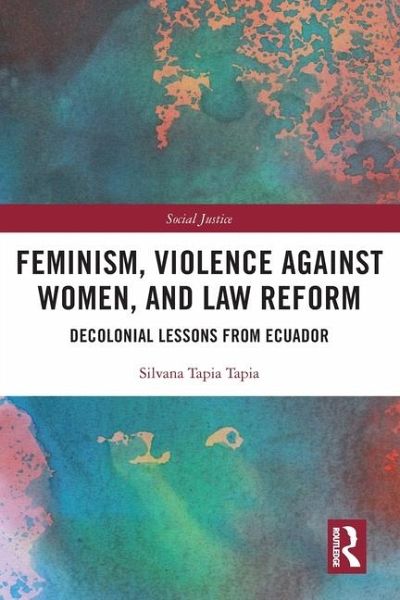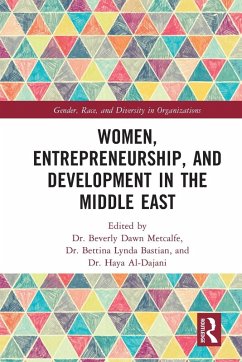
Feminism, Violence Against Women, and Law Reform
Decolonial Lessons from Ecuador
Versandkostenfrei!
Versandfertig in 6-10 Tagen
45,99 €
inkl. MwSt.
Weitere Ausgaben:

PAYBACK Punkte
23 °P sammeln!
Offering an important addition to existing critiques of governance feminism and carceral expansion based mainly on experiences from the Global North, this book critically addresses feminist law reform on violence against women, from a decolonial perspective.Challenging the consensus that penal expansion is mainly associated with the co-option of feminist campaigns to counteract violence against women in the context of neoliberal globalisation, this book shows that long-standing colonial narratives underlie many of today's dominant legal discourses justifying criminalisation, even in countries ...
Offering an important addition to existing critiques of governance feminism and carceral expansion based mainly on experiences from the Global North, this book critically addresses feminist law reform on violence against women, from a decolonial perspective.
Challenging the consensus that penal expansion is mainly associated with the co-option of feminist campaigns to counteract violence against women in the context of neoliberal globalisation, this book shows that long-standing colonial narratives underlie many of today's dominant legal discourses justifying criminalisation, even in countries whose governments have called themselves "leftist" and "post-neoliberal". Mapping the history of law reform on violence against women in Ecuador, the book reveals how the conciliation between feminist campaigns and criminalisation strategies takes place through liberal legality, the language of human rights, and the discourse of constitutional guarantees, across the political spectrum. Whilst human rights make violence against women intelligible in mainstream legal terms, the book shows that the emergence of a "rights-based penality" produces a benign, formally innocuous criminal law, which can be presented as progressive, but in practice reproduces colonial and postcolonial paradigms that limit and reshape feminist demands. The book raises new questions on the complex social and political factors that impact on feminist law reform projects, as it demonstrates how colonial assumptions about gender, race, class, and the family remain embedded in liberal criminal law.
This theoretically and empirically informed analysis makes an innovative contribution to feminist legal theory, post-colonial studies, and criminal law; and will be of interest to activists, scholars and policymakers working at the intersections between gender equality, law, and violence in Latin America and beyond.
Challenging the consensus that penal expansion is mainly associated with the co-option of feminist campaigns to counteract violence against women in the context of neoliberal globalisation, this book shows that long-standing colonial narratives underlie many of today's dominant legal discourses justifying criminalisation, even in countries whose governments have called themselves "leftist" and "post-neoliberal". Mapping the history of law reform on violence against women in Ecuador, the book reveals how the conciliation between feminist campaigns and criminalisation strategies takes place through liberal legality, the language of human rights, and the discourse of constitutional guarantees, across the political spectrum. Whilst human rights make violence against women intelligible in mainstream legal terms, the book shows that the emergence of a "rights-based penality" produces a benign, formally innocuous criminal law, which can be presented as progressive, but in practice reproduces colonial and postcolonial paradigms that limit and reshape feminist demands. The book raises new questions on the complex social and political factors that impact on feminist law reform projects, as it demonstrates how colonial assumptions about gender, race, class, and the family remain embedded in liberal criminal law.
This theoretically and empirically informed analysis makes an innovative contribution to feminist legal theory, post-colonial studies, and criminal law; and will be of interest to activists, scholars and policymakers working at the intersections between gender equality, law, and violence in Latin America and beyond.














